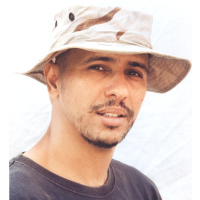Guantánamo Detainee, Who Wrote of Torture in Bestselling Book, is freed after 14 Years
 Mohamedou Slahi (photo: Int'l Committee of Red Cross)
Mohamedou Slahi (photo: Int'l Committee of Red Cross)
By Britain Eakin, Courthouse News Service
Guantánamo Bay Naval Base, Cuba (CN) — The man whose "Guantánamo Diary" presented a harrowing account of his treatment in more than a decade at the military prison camp was sent home to his native Mauritania on Monday.
"I just spoke with him and he is ecstatic," Mohamedou Slahi's attorney Theresa Duncan told Courthouse News late Monday night. "He was surrounded by family and already planning his future."
Mohamedou Ould Slahi, 45, arrived at Guantánamo in August 2002, and was held without charge or trial for more than 14 years.
Slahi was subjected to "severe torture," according to the American Civil Liberties Union, which has represented him for a decade.
"Mohamedou was one of two so-called 'special projects' whose cruel treatment [Donald] Rumsfeld personally approved," the ACLU said in a statement.
Rumsfeld approved the use of abusive interrogation techniques on Guantánamo detainees months before they were used on detainees at Abu Ghraib prison in Iraq.
At Guantánamo, Slahi was subjected to beatings, isolation, sleep deprivation and frigid rooms, and endured threats to arrest his mother.
The ACLU spearheaded a campaign to free him after the Dec. 1, 2015 release of his book, which garnered international sympathy. The ACLU also helped launch an online petition campaign which collected more than 100,000 signatures in support of his release.
The ACLU quoted the now-free Slahi in its statement on his release: "I feel grateful and indebted to the people who have stood by me. I have come to learn that goodness is transnational, transcultural, and trans-ethnic. I'm thrilled to reunite with my family."
Slahi began his "Guantánamo Diary" in his cell at Camp Echo in 2005, where he was held in isolation.
The government alleged that Slahi trained with and swore allegiance to al-Qaida while fighting with the mujahideen in Afghanistan in the early 1990s, but its unclassified, 1-page profile of him considerably modifies those allegations.
During his parole board hearing in June, one of his attorneys, Theresa Duncan, pointed out that the United States backed al-Qaida during the time Slahi was involved the group, to help the mujahideen oust Soviet troops and topple Kabul's pro-Soviet government.
The United States also claimed that Slahi recruited for "the Bosnian and Chechen jihad," and "facilitated the travel of future 9/11 operational coordinator Ramzi bin al-Shibh and two future 9/11 hijackers to Chechnya via Afghanistan in 1999."
Duncan told the parole board in June that a former chief prosecutor for the military commissions investigated the case against Mohamedou and concluded "there is absolutely no evidence that Mr. Slahi ever engaged in any acts of hostility towards the United States."
A federal judge who examined the available evidence and heard testimony from Slahi in his habeas case in 2010 said the man could not be detained indefinitely.
Though U.S. District Judge James Robertson ordered Slahi's immediate release, determining the man was not affiliated with al-Qaida when he was captured, the government had that decision vacated on appeal to the D.C. Circuit.
His case has withered on discovery in remand under the supervision of U.S. District Judge Royce Lamberth since.
The interagency parole board cleared Slahi for release on July 14. The board includes representatives from the Pentagon, the Department of Justice and U.S. intelligence agencies, among others.
In determining to release him, the board considered his "highly compliant behavior in detention," according to the board's statement on his release.
"The Board also noted the detainee's candid responses to the Board's questions, to include recognition of his past activities, clear indications of a change in the detainee's mindset," the statement said.
The board also took note of a strong support network for Slahi, including his attorneys and family. It also received a letter of support from a former prison guard in favor of his release.
"Before my assignment to Guantánamo, I had heard that the men I would be guarding were the worst of the worst and that they would likely hate me and everything the United States and I stood for," the letter said. "I expected to find angry and brutal men. In no way did I experience that with Mohamedou."
The anonymous guard said he would welcome Slahi into his home.
Slahi's transfer out of the prison brings the detainee population to 60, with 20 approved for release and awaiting transfer, the Pentagon said.
"The United States is grateful to the Government of Mauritania for its humanitarian gesture and willingness to support ongoing U.S. efforts to close the Guantánamo Bay detention facility. The United States coordinated with the Government of Mauritania to ensure this transfer took place consistent with appropriate security and humane treatment measures," the Pentagon said in a statement.
To Learn More:
Current Guantánamo Prisoner Publishes Book about his Experiences (by Noel Brinkerhoff, AllGov)
Guantánamo Prisoner Caught in Al-Qaeda Catch 22 (by David Wallechinsky and Noel Brinkerhoff, AllGov)
- Top Stories
- Unusual News
- Where is the Money Going?
- Controversies
- U.S. and the World
- Appointments and Resignations
- Latest News
- Trump to Stop Deportations If…
- Trump Denounces World Series
- What If China Invaded the United States?
- Donald Trump Has a Mental Health Problem and It Has a Name
- Trump Goes on Renaming Frenzy






Comments